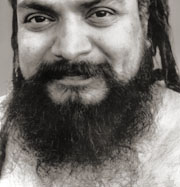Nirvana & the Living Liberated
Mitra’s translation frequently refers to nirvana, extinction and liberation. Today, the terms "enlightenment", "Self-realization" and "God-realization" are more commonly used. Perhaps the best term in today’s spiritual vocabulary is "Self-realization" because, ultimately, God is Self. Shivabalayogi himself insisted that God-realization and Self-realization mean the same thing.
Repeatedly Sage Vasishta insists that such words are interchangeable. To make distinctions only gets in the way. “Mind, understanding, egoism, intellect, consciousness, action and imagination, together with memory, desire, ignorance, and effort are all synonyms of the mind. Sensation, nature, delusion and actions are also words applied to the mind to bewilder one’s understanding. The simultaneous collision of many sensations diverts the mind from its clear sight of the object of its thought, and causes it to turn about in many ways.” (III.96.13-15)
Reality is constantly described as a void. God is an emptiness. Reincarnation is described as something terrible, as is the ignorance of believing in the material world. The highest good is to extinguish one’s own mind, to be utterly indifferent to everything. This is nirvana.
The reader necessarily wonders, “What’s the point of nothing?”
It takes considerable effort to assimilate what Vasishta is trying to explain in words because nirvana is inexplicable. It is not being catatonic. “I think no liberation is obtainable from stone-like, apathetic trance any more than one gains liberation from deep sleep. Only through consummate knowledge can reasoning men dispel their ignorance. . . . [Liberation] is not the stone-like inertness of some philosophers or the trance or sound sleep of others. . . . It is the knowledge of Brahman [God] as the prime source of all and the nothingness of visible creation. It is knowing God as all and yet nothing that exists.” (VIB.174.12-13,17-18)
What motivates any person to seek this knowledge is the same thing that motivated Rama, a deep apathy towards everything the world has to offer. Upon attaining the state of Self-realization, the living liberated abide in bliss and see all as Divine Consciousness. “All intellectual conceptions cease upon the spiritual perception of God. There ensues an utter and dumb silence.” (III.84.25) “Know that this state of transcendent bliss can only be attained through intense meditation.” (VIB.163.46)
Such a person does not identify with the physical or any other body and has no sense of personal ego. They engage in ordinary activities, as is the custom for the society in which they live, but they have an utter disregard for any personal benefit. Such people are unrecognizable by the ignorant, yet they command the respect and affection of all. The Self-realized have a feeling of fellow-love towards all creation. “Regard everything in the same light as yourself and observe a universal benevolence towards all beings. . . . Let your continued observance of toleration preserve you from acts of intolerance, which tend at best to oppress others.” (VIB.198.7, 35)
The living liberated perform their duties and enjoy the show — but they never forget that it is a show. It is not accidental that each story in Yoga Vasishta begins with a detailed and often long description of a setting of idyllic, natural beauty. The show can be very beautiful.
The living liberated see all things in a different light. “In this state of emancipation we see past and present, and all our sights and doings in them, as present before us.” (VIB.194.37) “When this material world is viewed in its ethereal and intellectual light, the distresses of this delusive world take to flight and its miseries disappear. As long as this intellectual view of the world does not reveal itself to the sight of a man, the miseries of the world trouble him stronger and closer on every side.” (VIB.178.59-60)
Rama asks how to tell the genuinely Self-realized from the pretending or hypocrites. (VIB.102.20-21) Vasishta answers that if they act as if perfect, that also is good. “Only those who know the knowable and are equally pure in their minds can distinguish hypocrites from other people.” (VIB.102.26) He goes on to explain that the realized stay out of the public eye. “They are the best of men who hide their good qualities from others. For what man is there who will expose his most precious treasure in the market with the raw produce of his land? The reason to conceal rare virtues is to keep them unnoticed by the public. The wise who lack desire for reward or reputation have nothing to reap or expect from the public.” (VIB.102.27-28)
![]()

